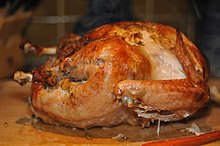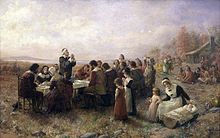
To you and yours--a blessed day!
Thanksgiving Day is a national holiday celebrated in Canada and the United States. It was originally celebrated as a day of giving thanks for the blessing of the harvest and of the preceding year. Thanksgiving is celebrated on the second Monday of October in Canada and on the fourth Thursday of November in the United States. Several other places around the world observe similar celebrations. Although Thanksgiving has historical roots in religious and cultural traditions, it has long been celebrated in a secular manner as well.
History
Prayers of thanks and special thanksgiving ceremonies are common among almost all religions after harvests and at other times.[1] The Thanksgiving holiday's history in North America is rooted in English traditions dating from the Protestant Reformation. It also has aspects of a harvest festival, even though the harvest in New England occurs well before the late-November date on which the modern Thanksgiving holiday is celebrated.[1][2]
In the English tradition, days of thanksgiving and special thanksgiving religious services became important during the English Reformation in the reign of Henry VIIIand in reaction to the large number of religious holidays on the Catholic calendar. Before 1536 there were 95 Church holidays, plus 52 Sundays, when people were required to attend church and forego work and sometimes pay for expensive celebrations. The 1536 reforms reduced the number of Church holidays to 27, but some Puritans wished to completely eliminate all Church holidays, including Christmas and Easter. The holidays were to be replaced by specially called Days of Fasting or Days of Thanksgiving, in response to events that the Puritans viewed as acts of special providence. Unexpected disasters or threats of judgement from on high called for Days of Fasting. Special blessings, viewed as coming from God, called for Days of Thanksgiving. For example, Days of Fasting were called on account of drought in 1611, floods in 1613, and plagues in 1604 and 1622. Days of Thanksgiving were called following the victory over the Spanish Armada in 1588 and following the deliverance of Queen Annein 1705. An unusual annual Day of Thanksgiving began in 1606 following the failure of the Gunpowder Plot in 1605 and developed into Guy Fawkes Day.[3]
In Canada
Main article: Thanksgiving (Canada)
While some researchers state that "there is no compelling narrative of the origins of the Canadian Thanksgiving day",[4] the first Canadian Thanksgiving is often traced back to 1578 and the explorer Martin Frobisher. Frobisher, who had been trying to find a northern passage to the Pacific Ocean, held his Thanksgiving celebration not for harvest but in thanks for surviving the long journey from England through the perils of storms and icebergs. On his third and final voyage to the far north, Frobisher held a formal ceremony in Frobisher Bay in Baffin Island (present-day Nunavut) to give thanks to God and in a service ministered by the preacher Robert Wolfall they celebrated Communion.[5]
The origins of Canadian Thanksgiving are also sometimes traced to the French settlers who came to New France with explorer Samuel de Champlain in the early 17th century, who celebrated their successful harvests. The French settlers in the area typically had feasts at the end of the harvest season and continued throughout the winter season, even sharing food with the indigenous peoples of the area.[6]
As settlers arrived in Canada from New England, late autumn Thanksgiving celebrations became commonplace. New immigrants into the country—such as the Irish, Scottish, and Germans—also added their own traditions to the harvest celebrations. Most of the US aspects of Thanksgiving (such as the turkey), were incorporated when United Empire Loyalists began to flee from the United States during the American Revolution and settled in Canada.[6]
Thanksgiving is now a statutory holiday in most jurisdictions of Canada, with the exception of the Atlantic provinces of Prince Edward Island, Newfoundland and Labrador, New Brunswick, and Nova Scotia.[7]
In the United States
Main article: Thanksgiving (United States)
In the United States, the modern Thanksgiving holiday tradition is commonly, but not universally, traced to a sparsely documented 1621 celebration at Plymouth in present-day Massachusetts. The 1621 Plymouth feast and thanksgiving was prompted by a good harvest. Pilgrims and Puritans who began emigrating from England in the 1620s and 1630s carried the tradition of Days of Fasting and Days of Thanksgiving with them to New England. Several days of Thanksgiving were held in early New England history that have been identified as the "First Thanksgiving", including Pilgrim holidays in Plymouth in 1621 and 1623, and a Puritan holiday in Boston in 1631.[8][9] According to historian Jeremy Bangs, director of the Leiden American Pilgrim Museum, the Pilgrims may have been influenced by watching the annual services of Thanksgiving for the relief of the siege of Leiden in 1574, while they were staying in Leiden.[10] Now called Oktober Feesten, Leiden's autumn thanksgiving celebration in 1617 was the occasion for sectarian disturbance that appears to have accelerated the pilgrims' plans to emigrate to America.[11] Later in Massachusetts, religious thanksgiving services were declared by civil leaders such as Governor Bradford, who planned the colony's thanksgiving celebration and fast in 1623.[12][13][14]The practice of holding an annual harvest festival did not become a regular affair in New England until the late 1660s.[15]
Thanksgiving proclamations were made mostly by church leaders in New England up until 1682, and then by both state and church leaders until after the American Revolution. During the revolutionary period, political influences affected the issuance of Thanksgiving proclamations. Various proclamations were made by royal governors, John Hancock, General George Washington, and the Continental Congress,[16] each giving thanks to God for events favorable to their causes.[17] As President of the United States, George Washington proclaimed the first nationwide thanksgiving celebration in America marking November 26, 1789, "as a day of public thanksgiving and prayer to be observed by acknowledging with grateful hearts the many and signal favours of Almighty God".[18]
Debate about first celebrations in the United States
The traditional representation of where the first Thanksgiving was held in the United States has often been a subject of boosterism and debate, though the debate is often confused by mixing up the ideas of a Thanksgiving holiday celebration and a Thanksgiving religious service. According to author James Baker, this debate is a "tempest in a beanpot" and "marvelous nonsense".[8]
These claims include an earlier religious service by Spanish explorers in Texas at San Elizario in 1598, as well as thanksgiving feasts in the Virginia Colony.[20] Robyn Gioia and Michael Gannon of the University of Florida argue that the earliest Thanksgiving service in what is now the United States was celebrated by the Spanish on September 8, 1565, in what is now Saint Augustine, Florida.[21][22] A day for Thanksgiving services was codified in the founding charter of Berkeley Hundred in Charles City County, Virginia in 1619.[23]
According to Baker, "Historically, none of these had any influence over the evolution of the modern United States holiday. The American holiday's true origin was the New England Calvinist Thanksgiving. Never coupled with a Sabbath meeting, the Puritan observances were special days set aside during the week for thanksgiving and praise in response to God's providence."[8]






No comments:
Post a Comment